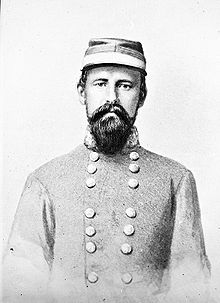7.3.20 Garnett
Today is July 3. So let me tell you about Dick Garnett.
Richard Brooke Garnett was born on November 21, 1817, on the Rose Hill estate in northern Virginia. He and his cousin attended West Point where they were average students. Dick served as an officer in the Mexican-American War. He was then promoted to Captain and posted to the new state of California. While there, he learned of the secession of the southern states, and though he supported union, he felt obligated to fight for the Old Dominion.
His cousin Robert gained the horrible distinction of being the first general officer killed in the Civil War. Garnett served in the Shenandoah Valley under Stonewall Jackson, and was promoted to the plum job: Brigadier General in charge of the legendary Stonewall Brigade. During the Valley Campaign of 1862 – a series of victories where Stonewall ran the federals in circles – Garnett suffered a rare defeat against overwhelming odds at the Battle of Kernstown. Stonewall was furious at Garnett for his retreat, and had him arrested and court-martialed for insubordination.
However, before the trial could get underway, Robert E. Lee needed to replace the injured George Pickett, so he reassigned Garnett to report to James Longstreet in northern Virginia. In this new capacity, Dick Garnett fought well and bravely in several of Lee’s trademark victories.
Stonewall’s criticism of Garnett stung him deeply, and he yearned to clear his name. Unfortunately, he would would never get the chance. In May of 1863, Stonewall orchestrated the greatest long-odds southern victory of the war at the Battle of Chancellorsville, but in the ensuing twilight pandemonium he was killed by friendly fire. Garnett put aside his grievance with his former boss to serve as a pallbearer at Stonewall’s funeral. But with Stonewall gone, he would never be able to face his accuser in court-martial.
Two months later, fate would bring Garnett to Gettysburg. On the first two days of that battle, the South came tantalizingly close to victory. Then, on the eve of the final day, Lee made a tragic decision: he would send one-third of his army, including Dick Garnett’s brigade, straight into the Union Army center. Longstreet foresaw disaster, and twice begged him to reconsider, to which Lee angrily replied, “the enemy is there, I intend to strike him.”
So now you are Dick Garnett, lying in your tent. You’ve been ordered to lead your men up a two-mile rise across an open field, into the teeth of the veteran Union army. It’s a gamble so desperate that Lee has ordered that the officers may not ride horses; they would draw all the concentrated fire of the enemy. But you are suffering from a fever and an injured leg so painful that you literally can’t walk. And if you don’t go out there, if you don’t do this thing, the charge that Stonewall laid on you will be on you forever. So you’ve asked for permission to ride your horse, and Longstreet has assented.
One hundred and fifty seven years ago this morning, Richard Garnett rose from his tent knowing full well that on this day he was going to die. He probably drank some coffee, had some breakfast, and gave instructions to his subordinates. Then, shortly after noon, he stumbled to his horse, pulled himself up, ordered his brigade forward, and led them out of the trees and into the meat-grinder that history has quite fancifully mislabelled “Pickett’s Charge.”
Dick Garnett’s body was never identified. He was buried in a mass grave at Gettysburg, though some of his presumed remains and those of several others were later reintered in Hollywood Cemetery in Richmond. In 1991, a cenotaph was erected there in his honor.His sword was later found in a pawn shop and returned to his family.
***
Over half a million people gave their lives in The Civil War, and they were all Americans. We don’t know most of their stories. As for Dick Garnett, we know he searched his heart, and chose state over country, and death over dishonor.
Whether you think that is admirable, or treasonous, is up to you. And there are plenty of ways of recognizing the dead without causing further suffering. You can visit Garnett’s grave in Richmond. Or go to Gettysburg and stop by the small marker dedicated to the Garnett brigade. There are lots of museums and battlefields that tell other parts of the story. (Please become a member, make hefty donations, buy a lot of stuff in the gift shop, and give nice online reviews to the rangers and interpreters.) And by all means, read a book.
The Civil War is over, and has been for over a century and a half. Let the dead lie in peace.
